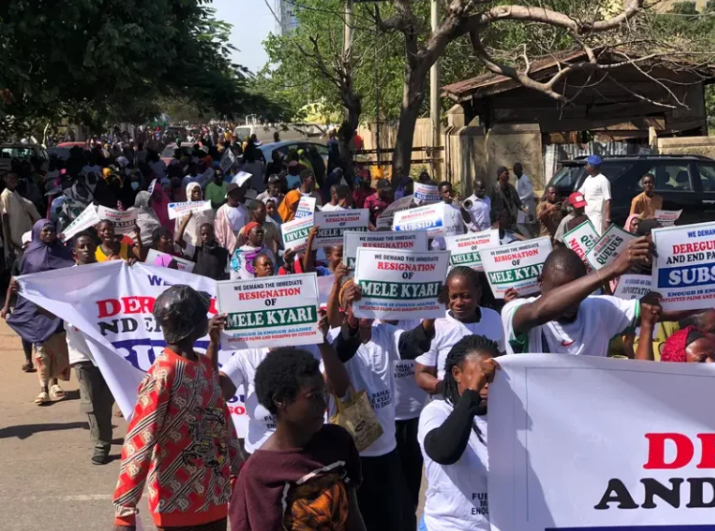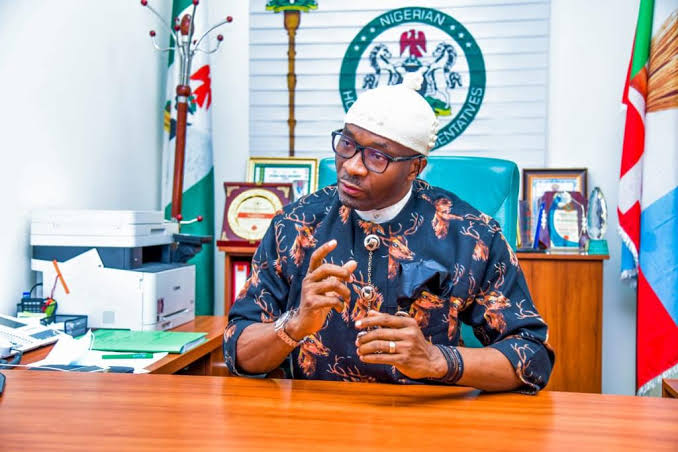News
Hunger: Protest In Abuja Over Fuel Crisis, Inflation

By Kayode Sanni-Arewa
Nigerians gathered in Abuja on Monday, launching a large-scale protest over escalating fuel costs, chronic fuel shortages, and mounting economic hardship.
Led by Abdullahi Bilal of the (Two Million Man March Against Oil Scam Cabal) and Barrister Napoleon Otache and Olayemi Isaac from Citizens and Economic Freedom Rights Activists in Nigeria (CEFRAN), the demonstrators demanded immediate action to address what they described as failed leadership in managing the country’s oil sector.
Central to the protests were grievances over skyrocketing fuel prices and the never-ending queues, which they argued have driven inflation and plunged millions of Nigerians into poverty.
The demonstrators condemned the current fuel subsidy regime, claiming it has only served to enrich a select few while leaving the majority struggling with high prices.
They called for full deregulation in the oil sector to ensure transparency, competition, and fairer fuel pricing.
Protesters also decried the importation of adulterated fuel, which they said is a corrupt practice that harms citizens by damaging vehicles and businesses.
They demanded an immediate halt to these imports and accountability for those responsible, questioning how substandard fuel continues to enter the country despite quality control assurances.
Additionally, the group criticized the unfulfilled promise of the Dangote Refinery to resolve Nigeria’s fuel crisis, expressing frustration over the billions of dollars spent on refinery development and refurbishing existing facilities.
They argued that despite these investments, fuel shortages persist, leaving Nigeria reliant on costly imports even as an oil-producing nation.
Highlighting the impact of the fuel crisis on the economy, protesters cited inflation surpassing 24% and a 200% rise in fuel prices, factors they say are deepening poverty across the country.
They urged President Bola Tinubu to intervene by overhauling leadership in the oil sector, enforcing greater accountability, and putting citizens’ needs first. The protesters vowed to continue mobilizing until their demands for reform and transparency are met.
Speaking to journalists during the mass demonstration, Abdullahi Bilal stated, “The Two Million Man March stands as a united voice for every citizen who has been betrayed by a system that continues to enrich a few at the expense of many.
“Today, we call for the immediate resignation of the current leadership in the country’s oil sector. Their management has failed Nigerians.
Under their watch, we have seen fuel prices skyrocket without consultation or consideration of the devastating impact on the people. We have endured fuel scarcity while substandard, adulterated fuel is imported, causing further hardship.
“We demand the complete removal of the fraudulent fuel subsidy regime that has only served to enrich a select few. Full deregulation is necessary to introduce transparency, competition, and fairness to our oil sector.
We also demand an end to the importation of adulterated fuel into Nigeria. This harmful practice must stop immediately, and those responsible must be held accountable for the damage caused to our vehicles, businesses, and livelihoods.
Nigerians have suffered long enough, wasting hours and days queuing for fuel. We demand a sustainable solution to the fuel scarcity crisis—no more excuses, no more delays. We deserve better.
“We also want to highlight the failure of the much-anticipated refinery. Nigerians were promised that this would solve our fuel crisis, but it has failed to deliver.
“This mismanagement has led to inflation reaching a shocking 24.5% as of November 2024. Fuel prices have increased by over 200%, plunging millions of Nigerians into deeper poverty.
To the government, we say: enough is enough. Nigerians will not stand by while the oil cabal continues to thrive at the expense of our nation’s welfare. We demand accountability, and we demand it now.”
On their part, Barrister Napoleon Otache and Olayemi Isaac, insisted: “This act of economic sabotage has led to endless fuel queues, skyrocketing fuel prices, and unprecedented disruptions in the daily lives of Nigerians.
“We demand an immediate end to fuel queues, transparency, and accountability from all involved parties. We want to know how substandard fuel continues to enter the country despite assurances of quality control.”
News
A Chat with Janet Odio Okolo: A Mother’s Journey Raising a Child with Down Syndrome

News
Hon. Nnamchi Begins Street Lights Deployment In Isi Uzo(Photos)

Honourable Paul Sunday Nnamchi, representing Enugu East/Isi Uzo Federal Constituency in the 10th House of Representatives, has fulfilled his promise to illuminate communities in Isi Uzo Local Government Area.
The lawmaker has just begun the deployment of high-density solar-powered street lights in Ikem Nkwo, marking the beginning of a massive rollout of the street lamps across the communities in Isi Uzo.
This initiative, which started in Enugu East Local Government Area in 2024, aims to support the fight against insecurity in the state which according to him was to add to what Chief Security Officer of Enugu State Barrister Peter Mba had done to secure the state to attracts foreign investments.
The lawmaker expressed concern over banditry attacks, particularly by herdsmen, in some communities within Isi Uzo and Enugu East Local Government Areas in the recent pasts.
He believes that illuminating these areas with high-density street lights would help address the insecurity adding that he was prioritizing border and farming communities in Isi Uzo, where banditry has displaced residents and restricted farming activities.
Communities in Ikem, Eha-Amufu in Isi Uzo which borders Enugu and Benue State and Ugwogo-Nike in Enugu East have been vulnerable to these attacks due to their strategic locations.
News
May Day: Kalu Hails Workers, Applauds Their Role in Nation Building

By Gloria Ikibah
Deputy Speaker of the House of Representatives, Rep. Benjamin Kalu, has extended warm wishes to Nigerian workers as the country marks the 2025 edition of International Workers’ Day.
Kalu praised workers across various sectors for their commitment and resilience, describing them as the engine that keeps the nation moving. He acknowledged their sacrifices and unrelenting drive, especially during tough economic times.
In his message, he highlighted the efforts of the current administration under President Bola Tinubu to improve the welfare of public servants. He referenced the National Assembly’s prompt backing of the new minimum wage as a sign of the government’s seriousness about workers’ wellbeing.
The Deputy Speaker appealed for continued patience and understanding from Nigerians, noting that the ongoing economic reforms, while challenging, are designed to bring long-term relief and prosperity.
Kalu also called for unity, and said the country can only overcome its present difficulties if citizens and leaders work together in good faith.
He therefore urged workers to keep the faith and remain steadfast in their duties, assuring them that brighter days are on the horizon, and wished Nigerian workers a peaceful and fulfilling May Day celebration.
-

 Metro20 hours ago
Metro20 hours agoGunmen storm University of Benin teaching hospital, kill doctor
-

 Metro20 hours ago
Metro20 hours agoFCTA destroys 601 motorbikes over violations
-

 News11 hours ago
News11 hours agoAlleged money laundering: EFCC produces Aisha Achimugu in court
-

 News20 hours ago
News20 hours agoJust in: FG declares tomorrow public holiday
-

 News13 hours ago
News13 hours agoJUST IN: Major General Paul Ufuoma Omu Rtd, dies at 84
-

 News13 hours ago
News13 hours agoTinubu hails Dangote’s World Bank appointment
-

 News16 hours ago
News16 hours agoSAD! Professor’s son takes own life inside varsity staff quarters
-

 News20 hours ago
News20 hours agoFull list: FG approves N110bn to rehabilitate medical schools 18 institutions











